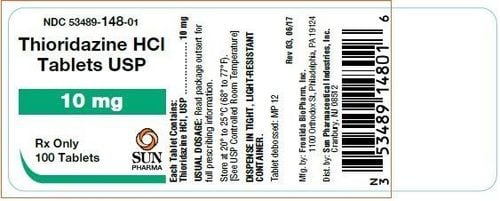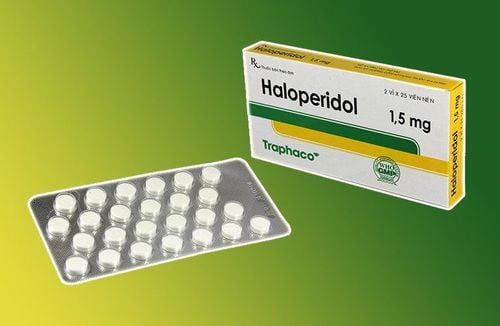This is an automatically translated article.
Levomepromazine is an active ingredient commonly used in the treatment of schizophrenia, somatic psychosis, manic psychosis... Let's learn about the uses and notes when using Levomepromazine 25mg over the past few days. article below.
1. Uses of the drug Levomepromazine
"What is Levomepromazine Maleat?". Levomepromazine maleate medicine 25mg contains the active ingredient Levomepromazine in the form of sugar coated tablets.
Active ingredient Levomepromazine belongs to Phenothiazine derivatives with similar effects to Promethazine and Chlorpromazine. However, the effect on the central nervous system of Levopromazine is stronger than that of Chlorpromazine.
Levopromazine maleate 25mg is indicated in the following cases:
Schizophrenia, manic phase psychosis, cyclical psychosis, organic psychosis; Personality disorder with excessive extroverted behavior, aggressive attitude; In combination with analgesics in the treatment of excessive pain.
2. Dosage of Levomepromazine
Levomepromazine Maleat 25mg is taken orally. The dose of the drug is prescribed by the treating doctor based on the patient's condition and absorption level. Some recommendations on the dosage of Levomepromazine are as follows:
Adults and adolescents: The initial dose used in the treatment of psychosis and severe pain is 50-75mg/day divided into 2-3 divided doses with meals. . The dose can be increased if needed. In the case of a dose of 100-200mg/day, the patient needs to stay in bed, limit movement to avoid the risk of orthostatic hypotension. In case of severe psychosis, the dose can be increased to 1g; Children: The initial dose used in the treatment of psychosis or sedation is 0.25mg/kg/day divided into 2-3 doses with meals. The dose can be increased if necessary and tolerated by the patient, but should not exceed 40mg/kg in children under 12 years of age; Elderly people: Use dose equal to 1⁄2 adult dose; Mentally ill or mentally ill with acute confusional state: Initial dose is 1/3 or 1/2 of the usual adult dose. The dose can be increased but not earlier than 2-3 days (preferably 7-10 days apart). Overdose of Levomepromazine can cause central nervous system depression with symptoms such as dizziness, ataxia, unconsciousness, somnolence, respiratory depression, convulsions... Extrapyramidal symptoms may occur. In addition, patients may have QT prolongation, sinus tachycardia, atrioventricular block, malignant syndrome due to sedatives..
3. Levomepromazine side effects
Levomepromazine Maleat 25mg may cause some unwanted effects as follows:
Common:
Cardiovascular: Tachycardia, hypotension standing, palpitations; Neurological: Parkinson's syndrome, extrapyramidal syndrome including acute dystonia, tardive dyskinesia, perioral tremor; Skin: Skin rash, photosensitivity, hypersensitivity reactions (maculopapular, urticaria, petechiae or edema); Respiratory: Nasal congestion, nasal congestion. Uncommon: Eye disorders, sexual changes, gynecomastia, weight gain, dysuria, vomiting, nausea, stomach pain, tremor.
Rare:
Neurological: Thermoregulation disorder, neuroleptic malignant syndrome, lowered seizure threshold; Skin and soft tissue: Changes in skin color; Endocrine: secrete more milk; Leukopenia, agranulocytosis; Hepatic: Hepatotoxicity, cholestatic jaundice; Eyes: Retinitis pigmentosa. Patients need to stop using Levomepromazine Maleat 25 mg and notify the doctor when experiencing unwanted effects for timely examination.
4. Notes when using Levomepromazine 25mg
4.1. Contraindications Contraindicated to use Levomepromazine maleate 25mg in the following cases:
Patients with hypersensitivity to Levomepromazine, Phenothiazine; People with severe heart, kidney or liver disease or a history of seizures; Patients who overdose on opiates, barbiturates or alcohol; People with leukopenia and a history of agranulocytosis; People who are comatose, have myasthenia gravis. 4.2. Levomepromazine can cause orthostatic hypotension, so patients treated with the drug should be bedridden or closely monitored for at least 6-12 hours of taking the drug.
Levomepromazine Maleat 25 mg should be used with caution in the elderly or in debilitated patients with heart disease, because of the risk of severe hypotension.
For patients who have to take the drug for a long time, it is necessary to have blood tests and liver tests, because the drug can cause serious liver and hematological side effects.
Use caution when using the drug in patients with manic psychosis.
For pregnant women: Levomepromazin Maleat 25 mg should not be used in pregnant women in the last 3 months of pregnancy, because of the increased risk of adverse reactions on the nervous system and causing jaundice in the newborn baby.
For women who are breastfeeding: In the dose of Levomepromazine maleate used to relieve pain in labor, breast milk may contain a small (negligible) amount of the drug.
5. Drug interactions Levomepromazine Maleat 25 mg
Levomepromazine Maleat 25 mg may cause the following interactions:
Concomitant use with antihypertensive drugs increases the risk of hypotension; Levomepromazine Maleat 25 mg increases the effectiveness of acetylcholine antagonists and skeletal muscle relaxants Succinylcholine; Levomepromazine Maleat 25 mg increases the effect of central nervous system depressants such as Barbiturates, Opiates, antihistamines, alcohol; The vasoconstrictor effect of adrenaline is reduced when used with levomepromazine. Once you understand the use of Levomepromazine Maleat 25 mg as well as how to use it, patients should adhere to taking the drug as prescribed by the doctor or on the instruction sheet before use. Using the right medicine and in the right dose will lead to better treatment results.
Please dial HOTLINE for more information or register for an appointment HERE. Download MyVinmec app to make appointments faster and to manage your bookings easily.













